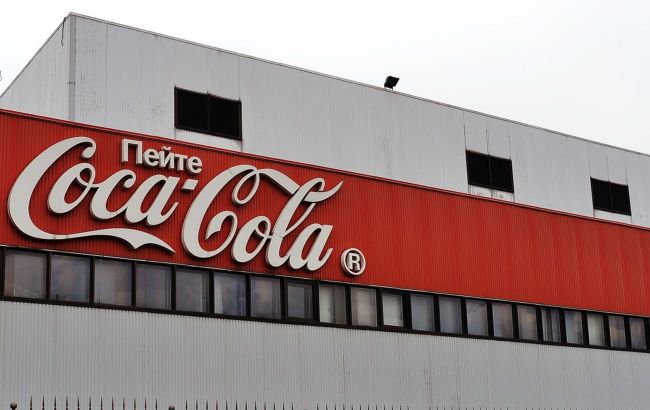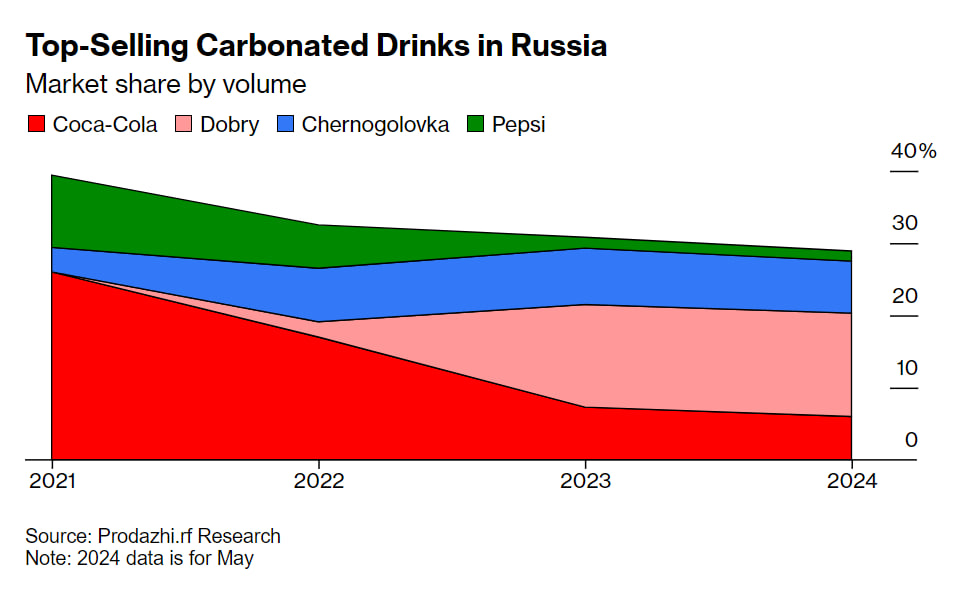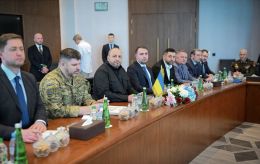Coca-Cola and Pepsi continue to operate in Russia despite claims
 Coca-Cola and Pepsi continue to operate in Russia despite claims (rt.com)
Coca-Cola and Pepsi continue to operate in Russia despite claims (rt.com)
Since the onset of the war with Ukraine, over a thousand multinational corporations have announced plans to scale back their operations in Russia. However, many remain in various capacities, including Coca-Cola and Pepsi, according to Bloomberg.
After Vladimir Putin's forces invaded Ukraine in February 2022, Coca-Cola was among the first multinational corporations to pledge its departure from Russia as a protest. To avoid inevitable issues with complying with anticipated Western sanctions against the Kremlin, Coca-Cola asked its partners to remove cans and bottles from stores, cease syrup supplies to soda machines, and halt beverage production.
Two years later, Coca-Cola's iconic red logo is still easily found in supermarkets and restaurants across the country. Furthermore, a new product called Dobry Cola, sold in cans with a strikingly familiar red hue and taste indistinguishable from the original means Coca-Cola remains a leading soda producer in Russia by some measures.
This situation is due to Multon Partners, the Coca-Cola producer in the country, which is owned by Coca-Cola HBC, a separate entity listed on the London Stock Exchange where the U.S. parent company holds a 21% stake. When HBC halted Coca-Cola production following the invasion, Multon introduced Dobry Cola, which became the most popular soda in the country, capturing 13% of the market. "The profits from selling Coca-Cola in Russia have merely shifted to Coca-Cola HBC, which has taken market share through the success of Dobry," says Garrett Nelson, an analyst at CFRA Research.
Coca-Cola itself remains widely available, imported from neighboring countries like Georgia and Kazakhstan. Following the invasion, Russia passed a law allowing branded goods to be sold without the trademark owner's consent. As trucks transport countless goods across the border, Russians seeking the real thing can still obtain it. This import activity has kept Coca-Cola third in the Russian soda market, holding 6% of the market share.

www.bloomberg.com
This doesn't mean Coca-Cola hasn't suffered. Although its volumes in Russia increased by 12% last year, they remained nearly a third below the 2021 levels when Coca-Cola was the best-selling soft drink with 26% of the market. Despite Coca-Cola benefiting from Dobry's popularity and Multon's leading juice business, the Atlanta-based company states it has relinquished control over this enterprise.
Hundreds of companies remain in Russia
Coca-Cola is far from the only one that hasn't fully exited Russia. In September 2022, PepsiCo Inc. announced it had ceased production and sales of Pepsi, Mountain Dew, and 7Up there, reducing its market share. But Pepsi soon introduced a new cola, Evervess, and increased production of Frustyle (similar to fruity Mirinda) at its half-dozen plants in the country. Last year, the Russian division's beverage sales jumped 12% to 209 billion rubles ($2.3 billion), according to local tax reports. The baby food and dairy business revenue rose 10% to 129 billion rubles.
According to a Yale School of Management study, since 2022, over 1,000 multinational corporations have announced plans to reduce their operations in Russia. But many have stayed. Unilever Plc and Nestlé SA, which had significant production facilities there, were reluctant to sell their enterprises at the steep discount the Kremlin demanded as an exit tax. Assets of Danish brewer Carlsberg AS and yogurt giant Danone SA were seized when they attempted to leave, although Danone eventually negotiated a sale to a government-favored entity. French supermarket operator Auchan, clothing retailer Benetton Group, and restaurant chains Subway and TGI Fridays continue to operate in Russia with no visible plans to downsize.
For companies still in the country, repatriating earnings is a challenge, requiring hard-to-obtain approval to move money out. But the profits are substantial. Boosted by military spending, Russia's economy grew by 3.6% last year, reducing unemployment to a historic low of 2.6% and sharply increasing wages. "There’s loose fiscal policy pumping record amounts of money into the public sector," says Tatiana Orlova of Oxford Economics. "And Russia’s labor market is extremely tight."
Notably, Ukraine’s National Agency for the Prevention of Corruption has listed PepsiCo and Mars as international sponsors of the war. These companies, despite claims of scaling down their business, continue to operate in Russia and pay taxes.
Additionally, The Insider reported that Coca-Cola's Russian division quadrupled its profit over the past year, earning more than before the war.

